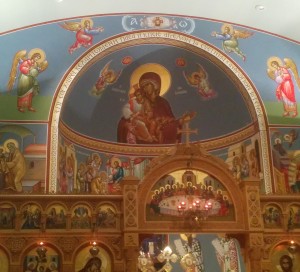That is a recording of the Hellenic College Holy Cross Seminarian Chanters, who were singing during the New Orleans Greek Festival. It was a beautiful sound, that of the two singers, that resembles the flourid organum of Léonin (also known as Leoninus), the principal voice moves freely while the other voice rests on single notes for very long periods of time. In any case, neither pronounces the words quickly, choising instead to meditate on the word of God. Because of this, it’s unlikely that you can hear that they’re singing in English.
I’ve written a bit about the importance of institutionalizing endangered languages. I also touched on the case of Hebrew (which I intend to write more on). Likewise, Greek seems to be institutionalized in the Orthodox Church, but not as strongly, at least in New Orleans, as the only exists in the writing, as in the picture to the right.
This wasn’t the case for Louisiana French in the past, when it was normal to attend Mass in French. Nowadays, Masses like that maybe only take place at festivals in Lafayette. But why? Evidently, there are priests who speak French and people that want to go to mass in French, judging by festivals and the fact that there have been opportunities to learn prayers on the Louisiana French Facebook group. In my opinion, it’s because of the dispersion of speakers. Maybe there are not enough of them in each parish, and the goal for the priests is to reach as many people as possible. That means that English is the most effective means because everyone in Louisiana speaks it. Yet the festivals gather enough francophones that Masses are possible, but in order for that to happen normally in the churches, speakers have to make themselves known as speakers, well enough that it seems necessary to offer services in French.

Leave a Reply
You must be logged in to post a comment.